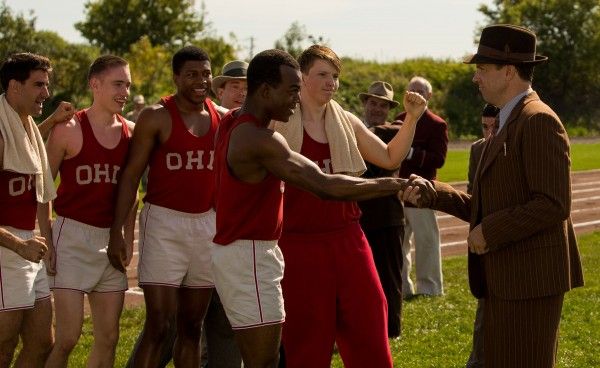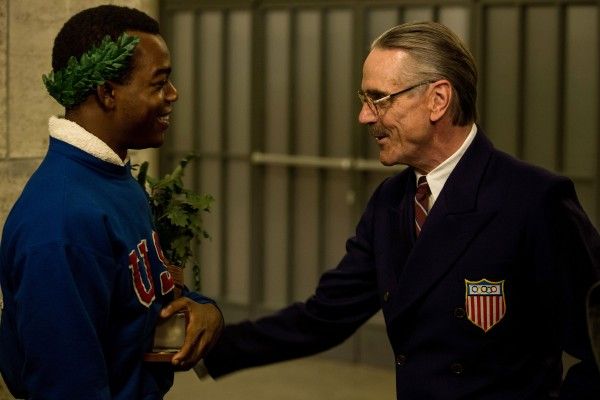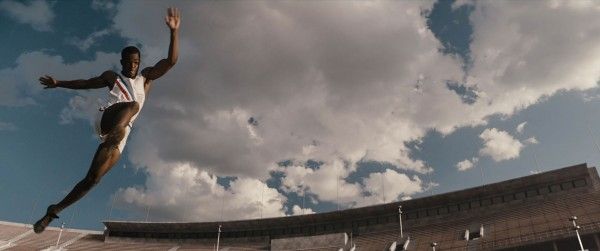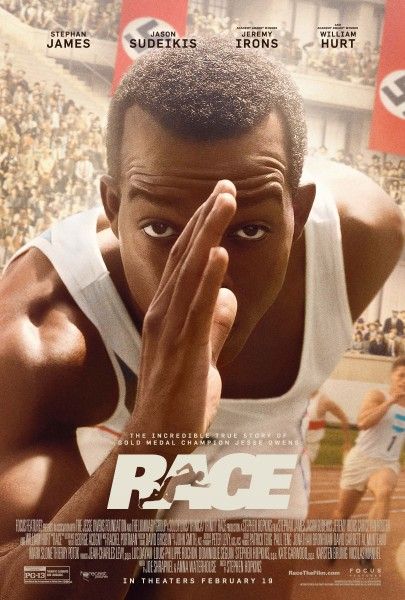Race could and should have been a rousing big screen chronicle of Jesse Owens’ triumph at the 1936 Summer Olympics, but the especially unfocused, disjointed and bloated screenplay sucks the life out of the material to such an extent that the film can’t build much enthusiasm for an athlete who won four gold medals and defied the Nazi regime in the process.
Stephan James leads as Owens. The film begins just as he’s about to head off to Ohio State University in 1934. Almost immediately after his arrival, his track coach, Larry Snyder (Jason Sudeikis), sees something special in him and decides to take it upon himself to train Jesse and ensure that he makes it to the 1936 Olympics in Berlin. As if the training isn’t tough enough, Jesse also must persevere in a world riddled with racial tension that’s under heavy pressure from Hitler and the Nazi regime, forcing the American Olympic committee to consider boycotting the Games altogether.
This is Owens’ story and in order to convey how remarkable his journey and achievements are, you need to include certain experiences and subplots. But, when you’re working within the confines of a single feature film, you simply can’t include it all. Even though select periphery storylines wind up being some of Race’s strongest material, Joe Shrapnel and Anna Waterhouse’s sloppy and overstuffed script winds up making this incredible true story far too muddled and tedious to conjure the reaction you’d expect from an inspiring sports film.
James made a strong impression with little screen time in Selma, so it’s no surprise that he delivers a commanding performance here. The character certainly could have benefited from a tighter script and better scene transitions, but James tackles every ounce of it with such conviction that he gets you engaged in every sequence that he’s in. However, in this case, a strong performance can only take the character so far. As presented in the film, Jesse is an odd mix of humble and cocky, and his relationships with key people in his life, particularly his wife Ruth (Shanice Banton), are so thin and unremarkable that exposition pushes the narrative forward, not raw emotion.
While James does have loads of chemistry with Sudeikis, the relationship between Jesse and Larry is yet another that suffers from feeling formulaic, which is unfortunate considering their connection grows amidst a fascinating cross between racism, oppression, politics and an athlete’s dedication to working hard in order to achieve his dreams. The film is formatted in a way that keeps Jesse’s work as a runner very separate from the issue between Hitler and the American Olympic committee until the final act of the film. Perhaps that makes sense because Jesse isn’t directly involved in the Olympics until that point, but Race needed some sort of thread connecting Jesse’s experience to Avery Brundage’s (Jeremy Irons) negotiations with Joseph Goebbels (Barnaby Metschurat), and it needed to be more powerful than the ongoing racism between Jesse and the Ohio State football players.
If the movie solely focused on Brundage’s efforts, Race could have been a far more interesting movie. Irons gives an excellent performance and completely outshines William Hurt as committee president Jeremiah Mahoney who seems tired and bored every moment he’s on screen. Metschurat also delivers strikingly menacing work as Goebbels. His heated conversations with Brundage require a translator, but that repetition never feels like dead air. You can always feel Goebbels’ intentions through Metschurat’s delivery and then when he’s waiting for a translation or a response, he maintains this scornful stare that makes you feel as though he’s always a step ahead.
Another element of the story that could have warranted its own feature is filmmaker Leni Riefenstahl’s (Carice van Houten) experience at the 1936 Games. She’s responsible for filming the Olympics to preserve the memory of the event and to immortalize the Nazi regime à la Triumph of the Will. Her scenes with Goebbels are easily the most enthralling elements of Race with Van Houten and Metschurat sparking a number of tense back-and-forths that raise the stakes in the film tenfold. David Kross’ work as Carl 'Luz' Long has a similar effect even though he only appears in the latter portion of the film. As a celebrated German long-jumper, he was under quite a bit of pressure when it came to how he handled Owens’ success.
The period setting and race scenes should have lent themselves to vibrant, exciting visuals, but director Stephen Hopkins and his team fell very short in that department. Rather than transport you back to the 1930s, the setting feels staged, especially when Hopkins cuts to wide shots. There are also loads of camera movements that don’t do much for the material, particularly one when Owens enters the Olympic arena. Hopkins chooses to cover the moment by having the camera spin in circles, perhaps to give the viewer a sense of how Owens felt stepping out in front of such a large crowd, but the technique isn’t very picturesque and is also quite dizzying. There’s also a scene featuring James and Banton that’s pivotal to the progression of their relationship, but Hopkins frames one of his shots in a way that obscures Banton’s face with an umbrella, which is unfortunate considering the film desperately needed to establish a more convincing connection between the two.
Race has some powerful scenes here and there, but not nearly enough to support a 134-minute running time. Too much time is wasted on sequences that don’t affect the big picture, like when Jesse falls for another woman while on the road or when Larry picks up a new pair of shoes for Jesse and gets a taste of what the Nazi regime is up to while he’s out and about in Berlin. Race is mostly a film that recounts Owens’ achievements. It’s not a human representation of his experience.
Grade: C





